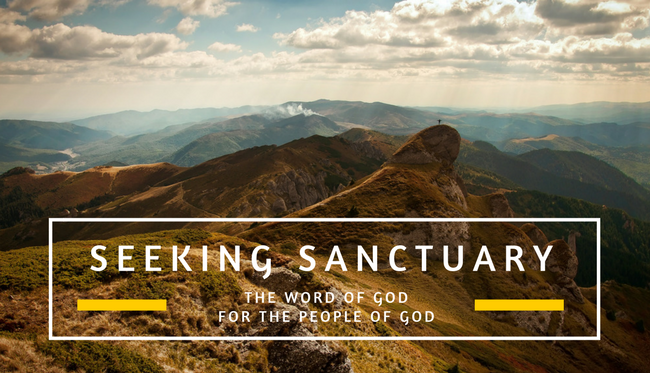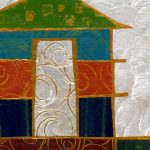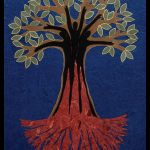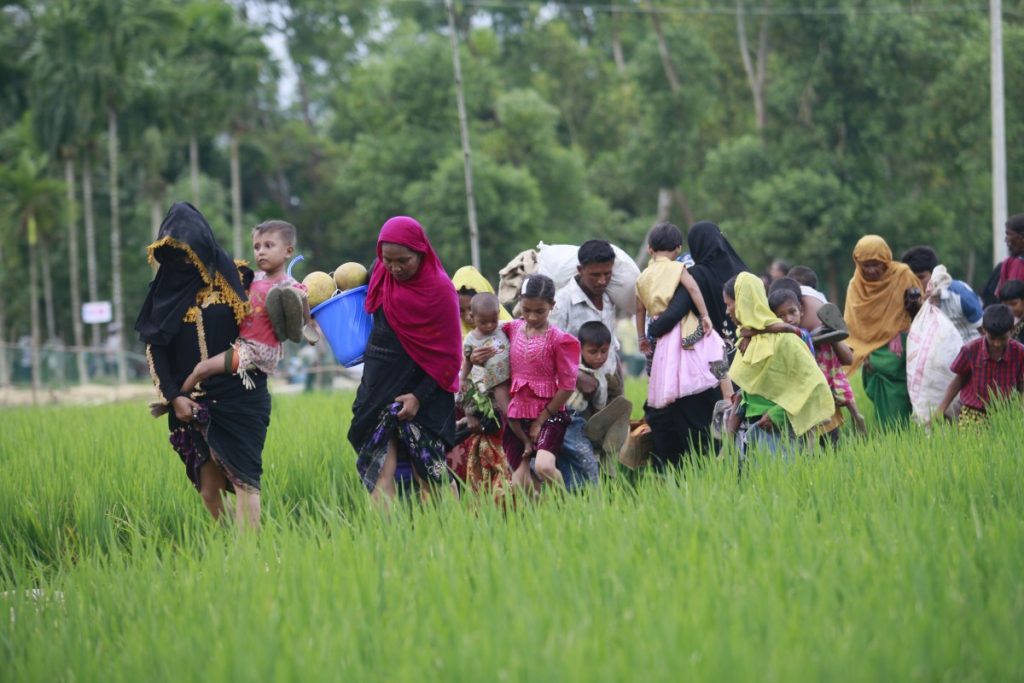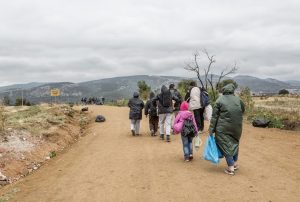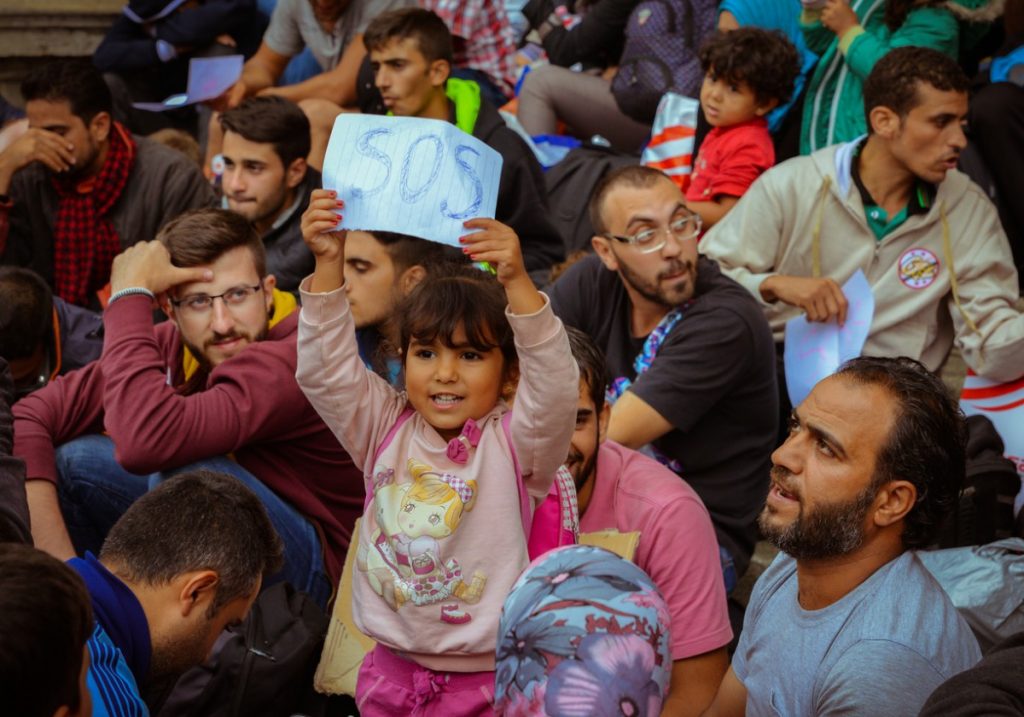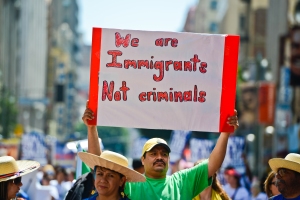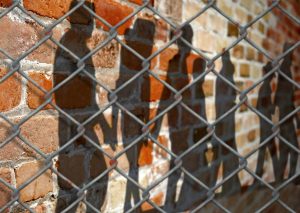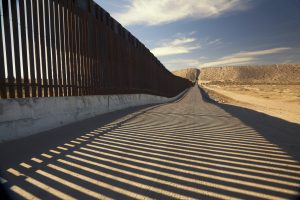This blog is about seeking sanctuary in the Word of God.
It addresses the precipitous decline in Scripture as a source of refuge and safety for contemporary Protestants, especially the most progressive among us.
The blog below engages an obscure section of the book of Jeremiah in conversation with the contemporary context of undocumented immigrants in the United States, and proposes that there is an emotional and existential correlation between the ancient community in Scripture and the contemporary community in our midst, both of which are seeking sanctuary, that can itself be another form of sanctuary when we allow the biblical story to inform our relationship to the contemporary context.
A Blessing Called Sanctuary
You hardly knew
how hungry you were
to be gathered in,
to receive the welcome
that invited you to enter
entirely—
nothing of you
found foreign or strange,
nothing of your life
that you were asked
to leave behind
or to carry in silence
or in shame.
Tentative steps
became settling in,
leaning into the blessing
that enfolded you,
taking your place
in the circle
that stunned you
with its unimagined grace.
You began to breathe again,
to move without fear,
to speak with abandon
the words you carried
in your bones,
that echoed in your being.
You learned to sing.
But the deal with this blessing
is that it will not leave you alone,
will not let you linger
in safety,
in stasis.
The time will come
when this blessing
will ask you to leave,
not because it has tired of you
but because it desires for you
to become the sanctuary
that you have found—
to speak your word
into the world,
to tell what you have heard
with your own ears,
seen with your own eyes,
known in your own heart:
that you are beloved,
precious child of God,
beautiful to behold,*
and you are welcome
and more than welcome
here.
-© Jan Richardson from Circle of Grace
Sanctuary Is for the Birds!
An erstwhile Sunday School teacher once instructed me to find sanctuary in Scripture; a suggestion that I considered to be along the same lines as the suggestion that the moon is made of cheese. I had no idea what that meant. The Bible was a hard nut to crack, filled with rules that I could not live into and stories to which I could not relate. And so I never considered Scripture to be a sanctuary, or even an authority, of any kind.
Nevertheless, my Episcopal tradition holds Scripture to be absolutely necessary for the formation of faith and the living of a faithful life. But Scripture has grown decidedly out of fashion over the last several decades, some might argue over the last century. The most recent Pew Research Center’s Religion & Public Life Project (September 28, 2010) offers some pretty sobering statistics in this regard. The trend in the general population is steadily moving away from engagement with scripture, but in the most progressive regions of our country, like New England, the trend is moving at break neck speed. Even for practicing Christians, Scripture is no longer a primary source of authority or sanctuary. And the research supports my own anecdotal observation as a parish priest in a small New England community of progressive Episcopalians.
This is a whopping big problem for the future of the Christian tradition. If Scripture is not on the map, then the tradition will ultimately lose its way. How will the Christian community be connected to the Word of God if the Word of God is not engaged in formation or regular worship?
23StoriesandMe: Stories Make Us Who We Are
But what if we were to take another look at the stories in the Bible in a traditional way, but with a new twist; through a new lens? What if we were to take another look at the stories that tell us where we have been as a people of faith; to whom we belong as people of faith, hear these stories not as anciant illustrations and exhortations, but rather, as part of our family tree. What if we hear these stories not in the context of our questions about inerrancy or authority or historical validity, or even moral certainty, but as intimate insights into the building blocks of our family system. Stories of how great uncle Abraham and cousin Judah and aunt Esther inform our contemporary generation of the faithful family of God. Like Ancestry.com for the spirit. And as the Ancestry.com slogan reads: Your family story is the story that leads you. Like our fascination with biological roots; what if we had the same passion for our spiritual roots?
 What if we read the stories of scripture, and especially the lesser known stories that have been previously untold, as building blocks that inform our current and future lives; stories that belong to us? What if we read those stories with the same curiosity with which we send our DNA off to 23 and Me? What if we treated each new found biblical story as a newly discovered letter in a grand parent’s steamer trunk? A new clue with new understandings of how we came to be who we are, and how who we are might help us to understand where we came from? What if that connection with our familial roots served as a sort of sanctuary in this untethered, fragmented, isolated culture in which we are desperately searching for meaning and belonging?
What if we read the stories of scripture, and especially the lesser known stories that have been previously untold, as building blocks that inform our current and future lives; stories that belong to us? What if we read those stories with the same curiosity with which we send our DNA off to 23 and Me? What if we treated each new found biblical story as a newly discovered letter in a grand parent’s steamer trunk? A new clue with new understandings of how we came to be who we are, and how who we are might help us to understand where we came from? What if that connection with our familial roots served as a sort of sanctuary in this untethered, fragmented, isolated culture in which we are desperately searching for meaning and belonging?
What follows is one such biblical gem. It’s a story about an ancient marginalized people seeking sanctuary amid their fear that the newly victorious political power of their day will exile them, or worse. And when such a story is heard in the context of contemporary undocumented immigrants seeking sanctuary after the 2016 presidential election, there emerges a connection between the two stories that itself offers a modicum of sanctuary to we who seeking grounding in these trying times. And the correlation between these stories from Scripture and this morning’s headlines can offer a distinct refuge from our human tendency to isolate ourselves from those who are not like us.
 Because if I am a Christian, and the story of the Judahite remnant belongs to my family, then I can relate personally to the plight of every undocumented immigrant in this nation. I can say to every undocumented immigrant: My family was once where your family is now.
Because if I am a Christian, and the story of the Judahite remnant belongs to my family, then I can relate personally to the plight of every undocumented immigrant in this nation. I can say to every undocumented immigrant: My family was once where your family is now.
Seeking Sanctuary Is No Walk In the Park!
It is in some ways astonishing that this section, the last we hear from our prophet Jeremiah, is so unabashedly overlooked in almost every Common Lectionary.
One reason might be that this passage from Jeremiah is very difficult to read. Despite its short length of only 3,500 words, there seems to be a language barrier. Nearly ten percent of the words are proper nouns with which the contemporary reader is not familiar. And too, the language that is used in the lengthy Word of God that is spoken through the prophet Jeremiah, comprising two of the five chapters, cuts against the grain of our modern linguistic conventions.
It is not altogether unlike the language barrier that often serves to separate and even alienate English and Spanish speakers. This language barrier is a hallmark barrier of the immigration crisis in the United States. And it is possible that the language barrier that makes ancient scripture difficult to decipher in contemporary contexts serves as a similar divider to the English/Spanish divide.
Seeking sanctuary is difficult in every language. It comes at the very end of an ordeal that elevates safety and refuge to the highest human concern. The effects of the ordeal suffered by the remnant in Judah is not far from that of undocumented immigrants in the United States.
Here is the story of one undocumented immigrant told in her own words:
The following illustrates connection and relationship between the community in Jeremiah 40-44 and the community of undocumented immigrants in the United States in 2016. It is an imagined conversation between undocumented immigrants in the United States whose plight is conveyed in photographs and a series of imagined letters between one of the remnant in Judah in Jeremiah 40-44 and his imaginary brother who is in exile in Babylon.
Two thousand five hundred years apart, these stories walk side by side.
Letters and Photographs: Same Story, Different Day
Jeremiah 40:1-6 – God abides with God’s people.
The biblical story is from the book of Jeremiah, chapters 40-44. If you think you have never heard this part of Jeremiah, you are probably right. It never shows up in the Common Lectionary. Never. And it is wicked difficult to read. But it is a great story!
It takes place after the Babylonian invasion, and after a vast majority of God’s people have been exiled to Babylon. The scripture tells the story of a small remnant left in Judah; a remnant not worth deporting, says scholar Derek Kidner.[1]
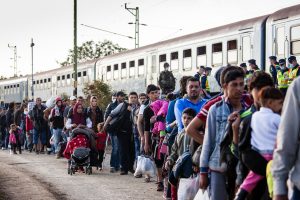 At the start of the passage, the prophet Jeremiah, who has apparently mistakenly been shackled by the invader, is released and given the choice to go where ever he chooses – with the majority of his people in exile, or he can stay in Judah with this remnant. He chooses to stay with the remnant who have been left behind, but are still in the land given to them by their God, YHWH. These people are least of the least. They are poor. They are vulnerable. They have few resources and fewer choices. They do not know how they will survive.
At the start of the passage, the prophet Jeremiah, who has apparently mistakenly been shackled by the invader, is released and given the choice to go where ever he chooses – with the majority of his people in exile, or he can stay in Judah with this remnant. He chooses to stay with the remnant who have been left behind, but are still in the land given to them by their God, YHWH. These people are least of the least. They are poor. They are vulnerable. They have few resources and fewer choices. They do not know how they will survive.
the Babylonian guard treats Jeremiah with almost astonishing mercy and generosity; more like a friend than a captive. The Babylonians offer Jeremiah his unabated freedom; his choice of where he wants to go and an allowance. As Jeremiah is unfettered, the Babylonian guard says to him: See, the whole land is before you; go wherever you think it good and right to go. (40:4) And then the pericope concludes: the captain of the guard gave him an allowance of food and a present, and let him go. (40:5) Jeremiah chooses to stay. Which is a serious big deal, and possibly the best good news on which this whole story hangs. In Jeremiah, God abides with this remnant. No matter what they do or where they go, God’s prophet goes with them.
Dear Ahi,
May YHWH cause my brother to hear, this very day, tidings of good. We are fine, although we know not why we have been left behind.
We miss you and our family and all who have been taken from our land. Legions of our brethren from Ramah have passed through on their way to Babylon. And yesterday Jeremiah was with them. Fettered like a captive until the guard saw him. Then he let him go. Immediately. And, get this, they told him that he could stay or go as he pleased. Can you imagine?! Stay or go as you please. Really!? We should be so lucky to have such a choice for ourselves.
Although, the decision might not be so simple. I mean, none of us want to leave Judah. Home is home. It is our inheritance. And yet, we long to be reunited with you and Mala and…everyone we love and miss. Everything has changed. And so I am not even sure what I would choose, were the choice to be mine. To stay or to go.
But the prophet chose to stay with us. Why? We are not entirely sure. And although he has been with us in days of old, maybe he has been so wooed by the invaders that he has abandoned us. Maybe he is no longer with us, but against us. Still, he is here. And though we can take some comfort in knowing that with him, his God also abides here with us. We hope and pray that YHWH is guiding and watching over you as well. We live in hope. May our captors be apprised that we are abiding in our land until we get a sign from YHWH.
Your brother, Jehleel[2]
Who can be trusted? Where is God?
Jeremiah 40:7-41:18 – This is What Happened.
But then they get a break. A benevolent overseer from their own ranks is appointed by the Babylonian king Nebuchadnezzar as their governor. His name is Gedaliah.
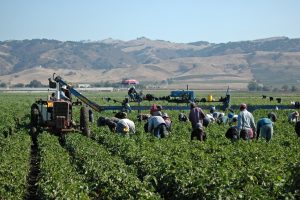 And all of a sudden, hope springs eternal. Other members of the Judahite community who scattered during the invasion, begin to come back. With Gedaliah prosperity is returned to the land. Crops are harvested. Wine flows.
And all of a sudden, hope springs eternal. Other members of the Judahite community who scattered during the invasion, begin to come back. With Gedaliah prosperity is returned to the land. Crops are harvested. Wine flows.
When the few left in the land hear that Gedaliah is the governor, they come from Moab and Ammon and elsewhere with what must have been a feeling of immense relief and surprise; perhaps there is a future for them in the land of Judah; perhaps they might enjoy a peaceful and prosperous life under the rule of a Judahite governor, after all. Gedaliah is a gift of sanctuary to this remnant.
Dear Ahi,
May YHWH cause my brother to hear, this very day, tidings of good. We are fine, actually better than fine. And we ask ourselves every day what we have done to deserve this blessing from YHWH. We are almost ridden with guilt for our good fortune. You remember Gedaliah the son of Ahikam? Remember? He delivered Jeremiah from almost certain death several years ago. Well his son has been appointed to be our governor! Blessed be God. WE know not why we have been accorded such good fortune, but we do not ask. We do not question such blessings lest they be revoked for our bite of that apple. Suffice it to say that life is so unexpectedly good that we are nearly reeling. The harvest is plentiful and we spend our days peacefully pinching ourselves!
And as the good news has traveled the land, it has become a bit of a reunion here in Mizpah. All manner of neighbors returning from Moab and where ever they may have fled during the invasion. Our brothers are returning now. Oh Ahi, what did we do to deserve this?! We must have done something very, very good. You and Mala are in our constant prayers.
Your brother, Jehleel
How great that we have this reprieve! Now we will be okay.
But, in fairly short order, the peace and prosperity, the sanctuary, is in perilous jeopardy. Johanan, one of the Judahite leaders, alerts the governor Gedaliah to a plot that is directed by the Ammonite king, a longtime adversary of the Judahites. Are you at all aware that Baalis king of the Ammonites has sent Ishmael son of Nethaniah to take your life? warned Johanan. (40:14)[3] But Gedaliah, in a naïve exhibit of extremely poor judgment, dismisses the warning as a “lie.” (40:16) Unfortunately, it is not.
Dear Ahi,
May YHWH cause my brother to hear, this very day, tidings of good. Life continues to be blessed. And even though we have heard rumors that there is some foreign opposition to Gedaliah’s governance, we are certain that YHWH will be our protector.
Otherwise, why would we have been spared the exile? Why would YHWH have allowed us to remain in our land? Why on earth would Jeremiah have chosen to stay with us if we were in such jeopardy? And why would YHWH have given us the gift of Gedaliah if that gift were to be extinguished so soon? Surely YHWH is with us. Surely we can trust YHWH. We pray that the good tidings of YHWH are with you and our loved ones as well.
Your brother, Jehleel
Again, who can be trusted?
Gedaliah is violently assassinated along with the murder of his court and a contingent of pilgrims who are just passing through on their way to the Temple, although it has been destroyed.
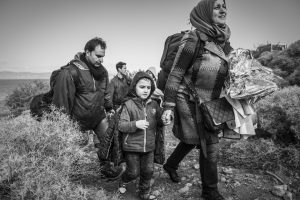 The vulnerable remnant is then kidnapped by the assassin who attempts to take them across the mountains to a rival territory called Ammon.
The vulnerable remnant is then kidnapped by the assassin who attempts to take them across the mountains to a rival territory called Ammon.
But before they are gone for good, the remnant is rescued by Johanan, their erstwhile governor’s military leader, who sends the assassin away and begins to lead the remnant to what he thinks will be a safer place than Judah: Egypt.
In an effort to evade the ire of the Babylonian king who might blame the remnant for the murder of his appointee, Johanan heads for the Narrow Place (the fitting literal translation of the Hebrew word for Egypt).
And so they head for Egypt.
Dear Ahi,
There has been a change of tidings, my dear brother. I write not from the fruitful fields of Mizpah, but from the harsh wilderness near Gibeon.
And I fear that we may never return to our sanctuary. Gedaliah is dead. And so are his forces and too a whole contingent of mourners from Shechem who were just in the wrong place at the wrong time. Seventy dead. Ten were spared, although they were forced to hand over their entire harvest to the aggressors. But, better hungry than dead. The cistern in the city center was filled to overflowing with the carnage.
And then, after two days of mayhem, the son of Nethaniah and his men rounded up the entire community at Mizpah, I mean everyone, and they forced us to go with them to Ammon.
Well, I say forced, we went without much resistance. After all, we had seen the carnage. We knew that they cared not for our lives, and so we obeyed their command without much ado. It was not worth the risk. As I am sure you will agree, better deported than dead.
But oh Ahi, where is YHWH? We did nothing to anger him. And yet here we are. Why were we spared your fate only to be subject to this? This is worse than exile. At least you are together with the community. We are out here on our own. But, the prophet is with us and so we live in hope.
Although we have been rescued from the marauders, we cannot go back.
We are following Johanan and his men. They delivered us. Although we wonder where they were last week. And even though Johanan warned Gedaliah, he fears that we will all be held accountable for the dissent and the killing of Nebuchadnezzar’s regent. We will not be safe in Mizpah, or any part of this land that is under the Babylonians. Johanan says that we must go to Egypt. Out of range. Beyond the reach of them. We have no time to make plans, and no choice but to trust the one who set us free. So we will go with Johanan.
I think we would have much preferred to have been exiled with you, than left in the land like this. At least we would have been together. Now, we have no idea where we are going or what we will find. Except that we are not safe here. All we have now is each other. Pray for us, Ahi, as we pray for you and our brothers. May good tidings be on their way for us all.
Your brother, Jehleel
Where do we go? What do we do? Who can we trust?
Jeremiah 42:1-43:3 – The people asked. God answered.
But first, the people (ALL of the people says the reading) summon YHWH’s prophet Jeremiah and ask for YHWH’s guidance, promising to obey whatever YHWH instructs.
All the commanders of the forces…and all the people from the least to the greatest approached the prophet Jeremiah and said, ‘Be good enough to listen to our plea, and pray to the Lord your God for us—for all this remnant. For there are only a few of us left out of many, as your eyes can see. Let the Lord your God show us where we should go and what we should do.’ (42:2-3)
Dear Ahi,
May YHWH cause my brother to hear, this very day, tidings of good. We are awaiting our own
tidings from the Lord our God. We gathered last night to decide where we go from here. We are so conflicted. We do not want to leave the land. But can we risk staying? If we will be accountable for Gedaliah’s demise we will likely be killed, not deported. We will be seen as villains and murderers.
Oh how I wish that we knew what to do. We have asked Jeremiah to ask YHWH to pray for us. Maybe God is still with us. His prophet is with us. Maybe he will tell us what to do, give us some comfort in our decision. If he will just confirm that we are to seek refuge in Egypt, the trip will be so much easier. And, we are half way there already. Pray for us, Ahi, as we pray for you and our community. Your brother, Jehleel
Where can we be safe? What does YHWH want us to do now?
After ten days, Jeremiah brings back the response from the Lord their God. YHWH tells them to stay in Judah and promises their protection and prosperity and future if they would just trust their God and stay in the land which was given to their ancestors. But if they choose to leave, they will perish. Stay in Judah says YHWH. Trust me! It’s an if/then proposition. If you will remain in the land, then:
Do not be afraid … says the Lord, for I am with you, to save you and to rescue you….I will grant you mercy….and restore you to your native soil. (42:10-12)
But if you disobey YHWH:
Thus says the Lord of hosts, the God of Israel: If you are determined to enter Egypt and go to settle there, 16then the sword that you fear shall overtake you there, in the land of Egypt; and the famine that you dread shall follow close after you into Egypt; and there you shall die. (42:15b-16)
The people have an immediate reaction of disbelief. They tell Jeremiah that the words cannot be from YHWH, they must be a trick from Jeremiah’s scribe Baruch. This vulnerable remnant who must have been scared out of their minds, trusts Johanan over Jeremiah. The remnant, vulnerable and caught between a rock and a hard place choose not to go back to the place that they know to be threatening and instead to take their chances in a new place, the interpretation is that they are disobedient. Their interpretation might be that they disbelieve that Jeremiah’s words are YHWH’s words. But really, maybe they are just afraid.
Dear Ahi,
We are truly between a rock and a hard spot, my brother. We asked for guidance from YHWH, but we got deception. The prophet has spoken, but it is hard to believe that he is speaking for the Lord our God. Why would YHWH want us to return to Judah? If YHWH wanted us in Judah, YHWH would have delivered Gedaliah from his fate.
Do not fear Nebuchadnezzar, says the Lord. But where was the Lord when Nebuchadnezzar’s governor was under mortal attack? Why would YHWH need to offer mercy and restore us in the land? We are here, in this desperate place because YHWH deserted us.
In answer to that, all we got was an apology. “I am sorry for the disaster that I have brought upon you.” Does that sound like the word of the Lord to you?
Why would el shadai need to apologize? It just doesn’t make sense. Instead it sounds like someone playing on our naïveté; someone trying to prevent our escape. Johanan believes that these words are not from YHWH, and he is the one who delivered us from Ishmael. He says this is a trick to lure us back so that we can be killed or exiled.
And honestly Ahi, as much as I miss you, I would rather take my chances in the Narrow Place as a free man than constantly fear the retaliation of Babylon in exile.
So we are no more certain of what to do or where to go now than we were before the prophet spoke. Keep us in your prayers, as you are in ours. Your brother, Jehleel
Who can we trust?
Why would YHWH send us back into the lion’s den?
Jeremiah 43:4-44:30 – The end of the prophet. But not the end of the story.
And so they defy the word of God and travel to Egypt where they are never heard from again. And neither is Jeremiah.
May YHWH cause my brother to hear, this very day, tidings of good. We have finally arrived in Tahpanhes, in Egypt. The prophet is still with us. Which means that YHWH is still with us. It is hard to believe that YHWH would be with us if we were not hearing YHWH’s word. So we must be okay. Judah will not come to an end as long as YHWH accompanies us. I am sure of it.
Your brother, Jehleel
Have we reached our sanctuary ? Where is God?
That’s the whole bad-news, good-news, bad-news, good-news, bad-news if YHWH is right chalupa!
And so, the ending is left virtually open for future interpretation. There is room for a seque l; room for future generations to interpret the ending for themselves, or to write a new one. As Walter Brueggemann says, this section of Jeremiah is an “ending that does not end.”[4] He says that it plunges into “unreadable lived experience.” The searing pain it portrays lingers as turbulent presences for generations. By refusing closure, the three endings (of which this is the first) continue the work of survival that gave rise to the book in first place. [5]
l; room for future generations to interpret the ending for themselves, or to write a new one. As Walter Brueggemann says, this section of Jeremiah is an “ending that does not end.”[4] He says that it plunges into “unreadable lived experience.” The searing pain it portrays lingers as turbulent presences for generations. By refusing closure, the three endings (of which this is the first) continue the work of survival that gave rise to the book in first place. [5]
And so, the next chapter is open for us to finish. A “recognition of theological-ideological intentionality in the book itself suggests that the reader of the book of Jeremiah is authorized by the book to continue the work of theological intentionality.”[6] And so it is our turn to write the next chapter.
Sanctuary: The Word of God for the People of God
After the 2016 presidential election many, many progressive Christians felt as “homeless” and adrift, at least spiritually and politically and ideologically, as were and are the remnant in Jeremiah and the undocumented immigrants in our midst, physically. All of a sudden, we were asking the same questions: Who can we trust? Where can we go? Is there a future for our co mmunity whose values run against the grain of the new law of the land? All of a sudden vulnerable, marginalized groups began to worry about their safety. LGBTQ people began to worry about losing basic rights and protections. Women began to worry about losing the right to make decisions about their own bodies. People of color increasingly worried about their very lives, as white nationalists seem to be welcomed back into the main stream of our common society. And DACA kids worried that their 2012 reprieve might be as gone as was the repreive of the remnant in Jeremiah after the assassination of Gedaliah. Where is the sanctuary for these populations who are at immediate risk of oppression, and exclusion, and deportation? And where is the sanctuary for progressive communities who care, existentially, about inclusivity, and compassion and dignity?
mmunity whose values run against the grain of the new law of the land? All of a sudden vulnerable, marginalized groups began to worry about their safety. LGBTQ people began to worry about losing basic rights and protections. Women began to worry about losing the right to make decisions about their own bodies. People of color increasingly worried about their very lives, as white nationalists seem to be welcomed back into the main stream of our common society. And DACA kids worried that their 2012 reprieve might be as gone as was the repreive of the remnant in Jeremiah after the assassination of Gedaliah. Where is the sanctuary for these populations who are at immediate risk of oppression, and exclusion, and deportation? And where is the sanctuary for progressive communities who care, existentially, about inclusivity, and compassion and dignity?
My small Episcopal parish is one such community that felt summarily unmoored by the 2016 election. Much of the congregation experienced a feeling of spiritual homelessness. And so this community answered its own desire to find refuge from the changing political ethos as well the concrete need for physical sanctuary on the part of its neighbors, by welcoming an undocumente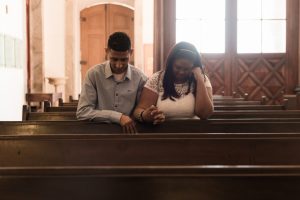 d immigrant family into the sacred space of the church.
d immigrant family into the sacred space of the church.
It was a difficult decision for many in the community. We had to closely examine our deepest values. Many feared that we might be seen as betraying the law of the land. But in the end, like the remnant who risked their flight to Egypt, and our undocumented friends who would forfeit their freedom to enter the sanctuary of our church, we felt that we simply had no choice but to offer the sanctuary to others that would in turn provide sanctuary for us; refuge from our helplessness in the face of the harsh dignity-crushing system that is breaking apart families and terrifying vulnerable communities of marginalized immigrants.
But there are risks all around. Like the risk that Jeremiah assumed by abiding with the remnant, all the way to their shared end in Egypt, the offer of sanctuary to undocumented people carries substantial risk for communities of faith. Click below to read how one church in Springfield, Massachusetts is under threat of losing their tax-exempt status, among other things.
Link to the story of sanctuary is Springfield, MA
In the end, I propose that Jeremiah 40-44 itself offers a modicum of sanctuary. 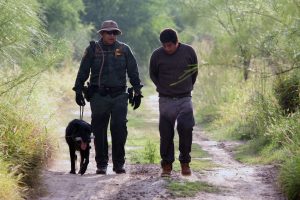 It is the relief and the refuge from uncertainty and judgmentalness that comes when we realize that our family has been here before. That we have experienced the fear and the vulnerability of our undocumented neighbors in our own family tree. We have walked in their shoes. And in this realization we not only find some sanctuary for ourselves, but also the sort of connection with other marginalized communities that helps us live into our commandment to love each other without fear.
It is the relief and the refuge from uncertainty and judgmentalness that comes when we realize that our family has been here before. That we have experienced the fear and the vulnerability of our undocumented neighbors in our own family tree. We have walked in their shoes. And in this realization we not only find some sanctuary for ourselves, but also the sort of connection with other marginalized communities that helps us live into our commandment to love each other without fear.
The challenge: 23StoriesandMe
What if we could identify 23 biblical narratives that were previously unknown or little-known, and that shed some light on who we are as a family of God in our own contemporary context?
I propose this as a challenge to our youth! Dig up the stories that make up our spiritual DNA. Who are we? From where have we come? What have we overcome? And how are we connected? The results of such a project would be nothing short of a scriptural revival! Scriptural sanctuary.
Here is the challenge:
Find one story
that is not included in the Revised Common Lectionary, but contributes to our faithful family tree in ways that resonate and with our contemporary life and culture.
Post your finding in the comment section of this blog.
We will collect and publish them
as a dedicated blog of the 23 best heretofore unknown stories
that inform the story of the family of God.
Submit your entry to
23Stories and Me
today!
Every passage accepted for this project
will win a limited edition 23StoriesandMe hoodie!
Ready, set, read!
You shall also love the stranger, for you were strangers in the land of Egypt.
– Deuteronomy 10:19, NRSV
Endnotes:
[1] Derek Kidner, The Message of Jeremiah, The Bible Speaks Today (Downers Grove, IL: InterVarsity Press, 1987),129.[2]. The first line and the basic form of this letter is taken from the Lachish Letters. “Yadin Presents New Interpretation of the Famous Lachish Letters,” Center for Online Judaic Studies (blog), June 23, 2008, http://cojs.org/yadin-presents-new-interpretation-of-the-famous-lachish-letters/. The Hebrew name Ahi means “my brother” and Jehleel can be translated as “God grievously afflicts.”
[3]. Walter Brueggemann describes the assassination as an act of pure resistance. ““The assassination of Gedaliah is in fact an act of resistance against Babylonian governance.” Walter Brueggemann, A Commentary on Jeremiah: Exile and Homecoming (Grand Rapids, MI: William B Eerdmans, 1998) 340.
[4]. Walter Brueggemann, Like Fire in the Bones: Listening for the Prophetic Word in Jeremiah. (Minneapolis: Fortress Press, 2006) 86.
[5]. Ibid., 86.
[6]. Ibid., 2
Art icons are used with permission:
House of Prayer © Jan Richardson. janrichardson.com
Family Tree © Jan Richardson. janrichardson.com
Getting Grounded © Jan Richardson. janrichardson.com
Points on a Line © Jan Richardson. janrichardson.com
All the Same © Jan Richardson. janrichardson.com
Spokes © Jan Richardson. janrichardson.com
All photographs are royalty-free and have been purchased from iStock by Getty Images. https://www.istockphoto.com/legal/terms-of-use
